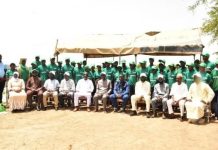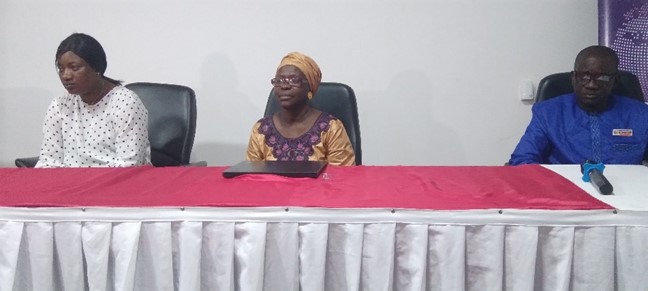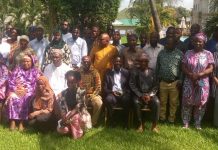By Kebba AF Touray
Photo: From Left Ada Joof, Tabu Sarr Njie, and Alhagie K Saho
The Westminster Foundation for Democracy (WFD), on Saturday, 31 August 2024, trained elected and nominated Women Councilors and District Tribunals, from each of the Councils.
The day-long training was to provide training to the trainees on issues of gender and development, as a means to strengthen democracy and good governance at the grassroots.
The WFD envisaged the training to enable the local councils, Women Councilors and District Tribunals in particular to become more responsive to the needs of women and marginalized groups.
Fatou Ada Joof, Women Councilor of Banjul City Council (BCC), said the training aimed to empower women in leadership positions, adding that it will enable women to participate in major critical positions.
She said: “This is very crucial as across the world, women leadership is recognized in critical decision-making positions, which we ought to cherish. One way to achieve this is to discuss with our fellow women folks who are outside, to be motivated and encouraged to contest and participate in key leadership positions.”
Mr Alhagie K Saho, Vice Chairman of Kerewan Area Council, said putting women in leadership positions will greatly contribute towards having a better country.
He said: “Women participation in politics and development is crucial in fostering inclusive growth and sustainable progress. When women are in leadership positions, a lot of changes are effected in terms of progress.”
He added that when women are actively involved in politics and development, they bring about diverse perspectives, innovation, solution and understanding of the needs of the community, as they are abreast with all issues in the communities and homes.
Tabu Sarr Njie, the Country Director of WFD, said WFD opened its office in 2018 and aimed at supporting the building and strengthening of democracy in the Gambia.
She said that since inception, the National assembly among other stakeholders has been their main partner which also hosts the WFD country office.
She added that around the world, WFD is helping to make countries’ political systems more inclusive and accountable.
“In an inclusive and accountable political system, all citizens, regardless of sex, origin, disability, ethnicity and religion and any other status have the space and ability to participate and influence policies and laws as well as hold institutions and people with power responsible for their decisions,” she said.
She stressed that capacity building is a crucial aspect of institutional development and ensuring success by providing staff with the necessary knowledge, skills and resources to enhance their performance, productivity, and professional growth.
She remarked: “The objective of the training is; to strengthen capacity and build resilience of women leaders in local councils and District Tribunals on gender and power to recognize diversity and inclusion in decision making processes and your respective institutions thus noting the causes of democratic integrity, social justice, and human rights.”
She pointed out that the essence of this training lies in understanding and application of the principles, and standards of the legislations that gave the trainees the mandate and authority to contribute to fair dispensation of justice to situations that may fall before the participants, but equally to gender sensitive budgetary and service provision processes.
She said that councils are responsible for making significant decisions that have a far-reaching impact on their community whilst District Tribunals are the courts adjudicating at grassroots and its operation are the responsibility of council except for capital offences such as rape, arson and murder.
Therefore, she said building their capacity is very important, and that local councils across the country serve everyone, including men, women, boys and girls.
She stated that the District Tribunal addresses social issues that affect everyone such as marriages, inheritance and divorce.
The WFD Country Director said that when confronted with major decision making, it is important to know what to do and how to do it according to laws that give the authority to exercise their responsibility.
“Local communities are encouraged to have a say in what their council does and how it does it since they pay taxes for these services whilst protecting the rights of vulnerable populations, including women and children. Your role is indispensable in ensuring that democratic institutions not only function effectively, but also remain responsive to the needs of all citizens,” she said.























